At the end of last year, Esports Insider was a news site catering to the growing esports crowd, as the name suggests. Two months later it was one of the biggest gambling sites on the planet, sucking in traffic for hard-to-rank keywords and directing those visitors to a network of crypto and gambling sites.
Two (presumptive) manual penalties later, they’re still at it.
Editor’s note: An earlier version of this article erroneously ascribed ownership and activity to ‘Finixio,’ suggesting that the corporate entity ‘Finixio Ltd’ was responsible; in fact, the responsible parties are members of the Finixio ownership and management team in their individual, personal capacities and the article has now been amended to reflect this.
Let’s look at what happened to the site, and how they managed to get away with it three times in a row.
The story starts when SEO Charles Floate notices something odd about the site.
Charles Floate identifies what’s happening with Esports Insider
Earlier this year, British SEO expert Charles Floate flagged something curious.
A website that had spent the last few years offering a steady diet of esports news, talking about the world of competitive video games. Readers would get details of team dynamics, recent scores, news and opinion on current competitions, hype about upcoming games and postmortems on past ones. The site essentially approached esports the way a sports website would approach any other sport.
So far, so good.
Esports Insider ranked for most of the stuff you’d expect. And it served as a hub for a growing scene, attracting tons of high-quality backlinks. Right now, it sits at just under a million backlinks from over 70k domains.
These links come from sites like The New York Times, The Los Angeles Times, and the BBC. They’re monster links with tons of juice and there are a ton of them.
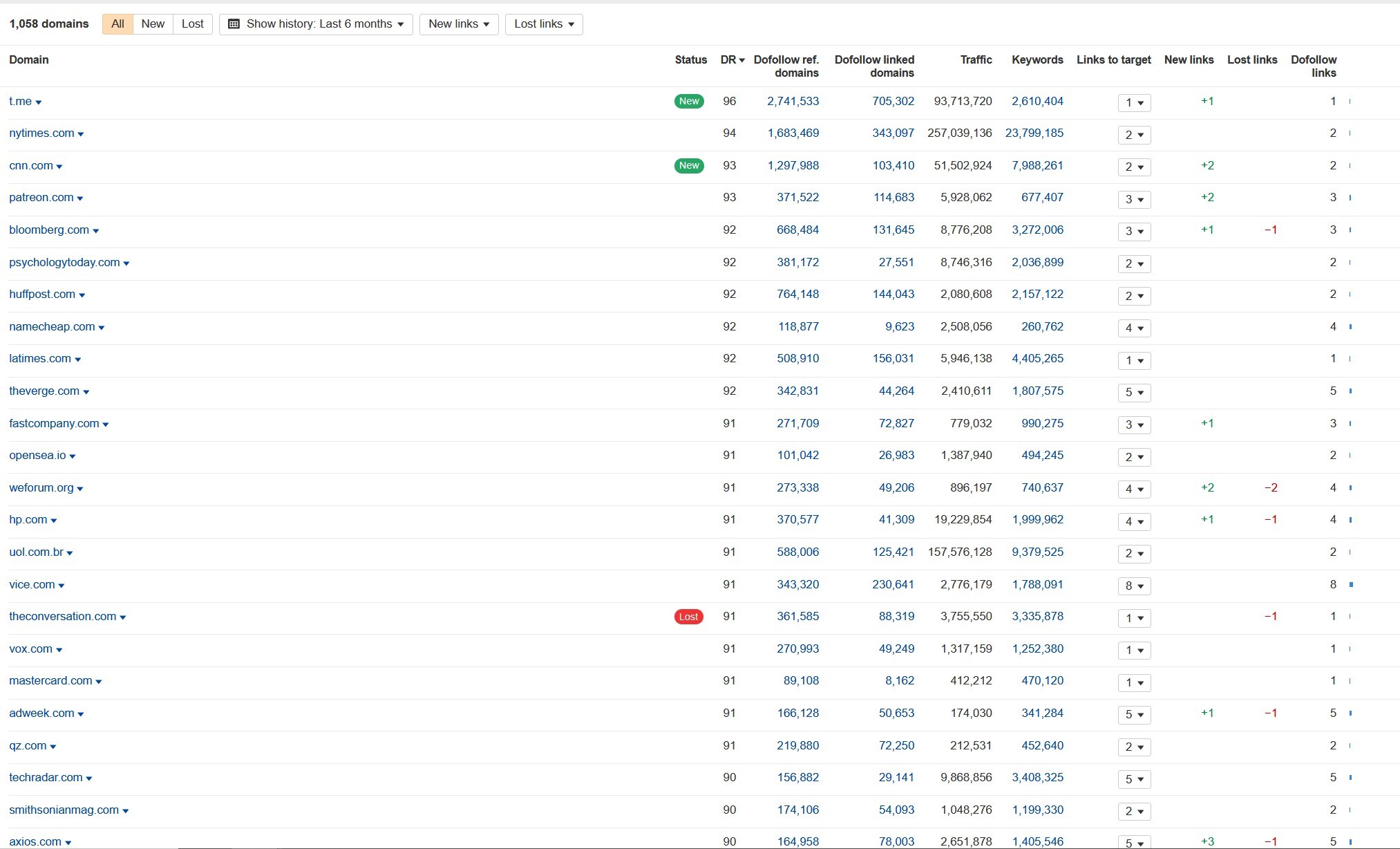
Bloomberg, Vice, Quartz… my guess is, this is one of the few esports sites that’s authoritative enough (and well-known enough) for mainstream journos to cite, and that makes sense; all the links I checked went to esports news and analysis posts.
Whatever the reasons for the details, this is a site with killer links and good authority.
You know where this is going, right?
When Charles published his piece, Esports Insider was doing things that it shouldn’t have been able to do. The view from tools like Ahrefs was initially confusing.
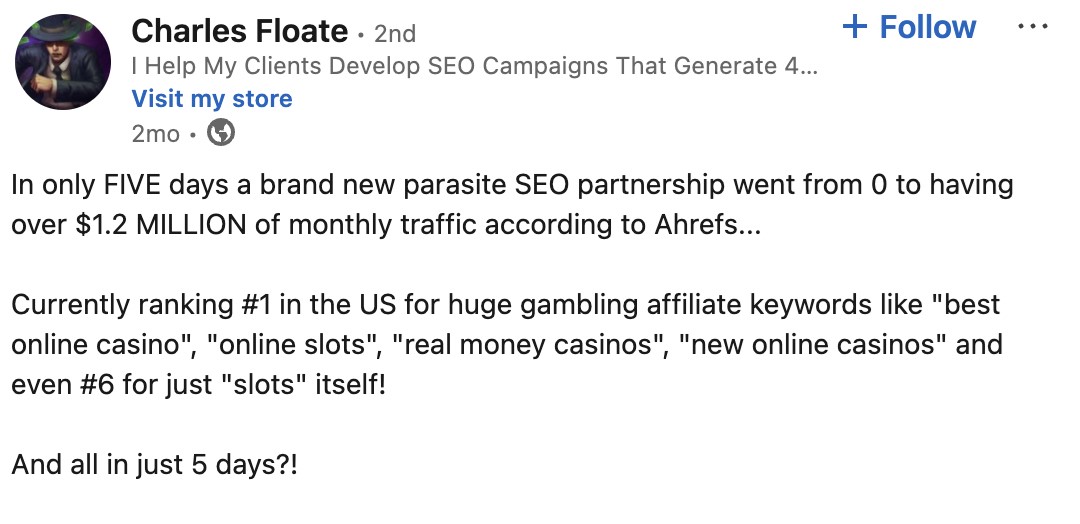
For reference, ‘slots’ is not an easy keyword to rank for:

https://www.semrush.com/analytics/keywordoverview/?q=slots&db=us
(Note: Charles mentioned that this traffic is worth $1.2 million but when Ahrefs tells you that, it’s telling you how much it would cost to buy the same traffic with PPC ads. The business value of these visitors is likely an order of magnitude higher, since they’ll be funneled to a global network of crypto and gambling sites.)
Ranking for a keyword like this is expensive and difficult. It should take forever to rank for this, especially keywords like “online casinos” in google.com.
Five days? What’s going on?
Charles already called it in his intro. Esports Insider is a parasite operation.
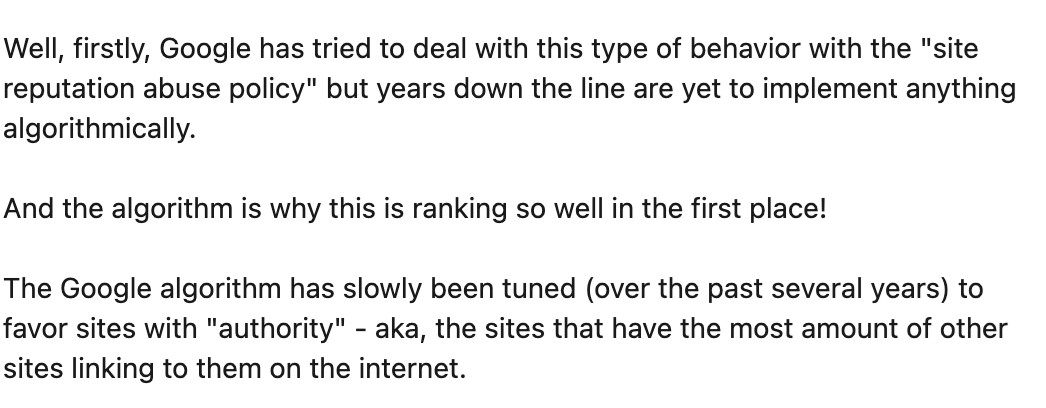
Yep, that’s a pretty good explanation. In fact, as we’ll see, when sites like this do get penalized, it’s manual penalties for the most part and the cunning and skilful can wriggle out from under those. I have seen it happen in less than a week.
(If you don’t know what parasite SEO is, it’s this: instead of getting your site about xyz to rank, you get a site that ranks and put your stuff about xyz on there. Bingo, your content ranks now. Is it ethical? Not really. Does Google say they hate it? Definitely. Do they rank sites like this all the time? Yes they do.)
But is Esports Insider really part of a parasite operation? Who’s behind pivoting an innocent esports website into a gambling hub?
Charles goes on to identify this author, Viola d’Elia, as the author of most of the recent content that focuses on gambling.
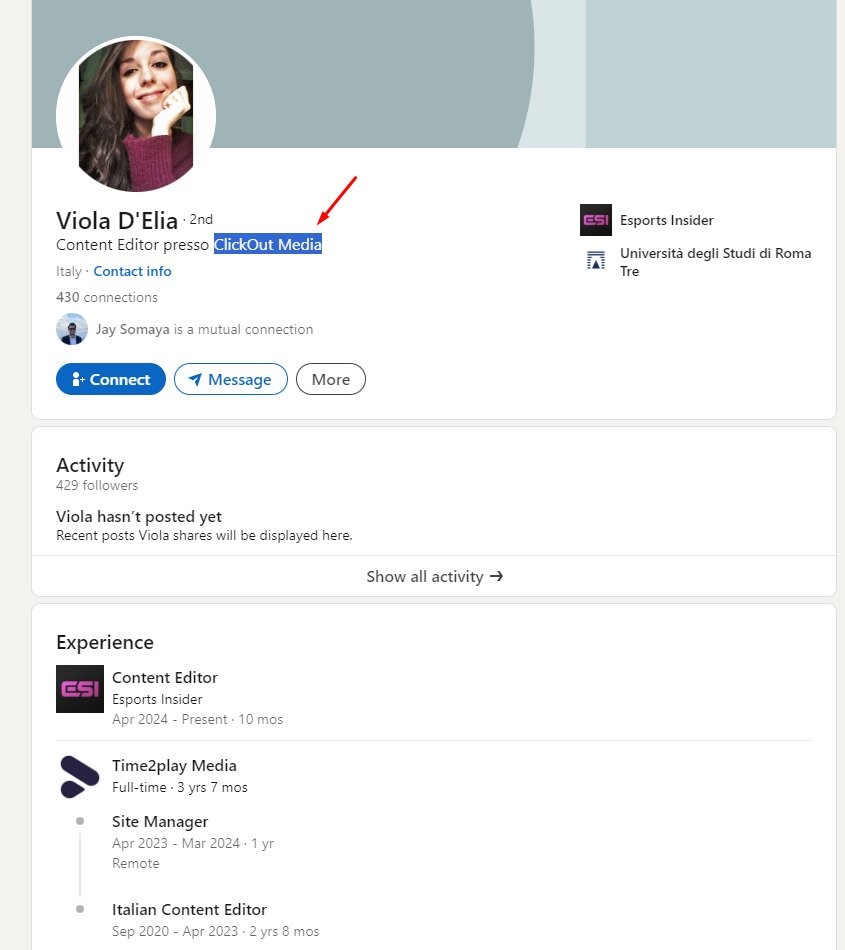
https://x.com/Charles_SEO/status/1880962917967020494/photo/1
That’s her LinkedIn in January this year; references to Clickout have been scrubbed now.)
And we’ve met Clickout before.
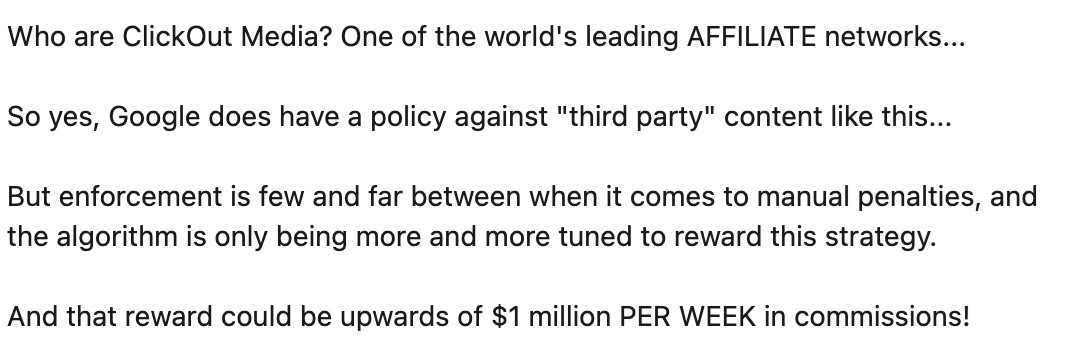
Esports Insider is owned by the Finixio / Clickoutmedia team
Clickout Media is the company that handles promotion and media communications for the global network of crypto, gambling and parasite SEO operations ultimately controlled by managers and owners of Finixio. In the past, corporate communications from Clickout have clearly indicated that Clickout is simply Finixio in different branding — see the recruiter’s email I received in this article.
The playbook should be familiar if you’ve read any of my other work on this operation. It goes like this:
- Identify a website with good domain authority. If it’s big enough to generate real traffic but small enough to swallow whole, buy it.
- Keep the existing content and site structure. Create a new area of the site dedicated to gambling and stuff the site with gambling content to get it to rank for specifically-designated, often regional gambling related keywords.
- Funnel that traffic to a network of online casinos that you control, or to a crypto wallet that you also control.
At its heart it’s not complicated. But the Finixio team are very, very good at it. And you can see it play out over at Esports Insider.
First, they buy the site
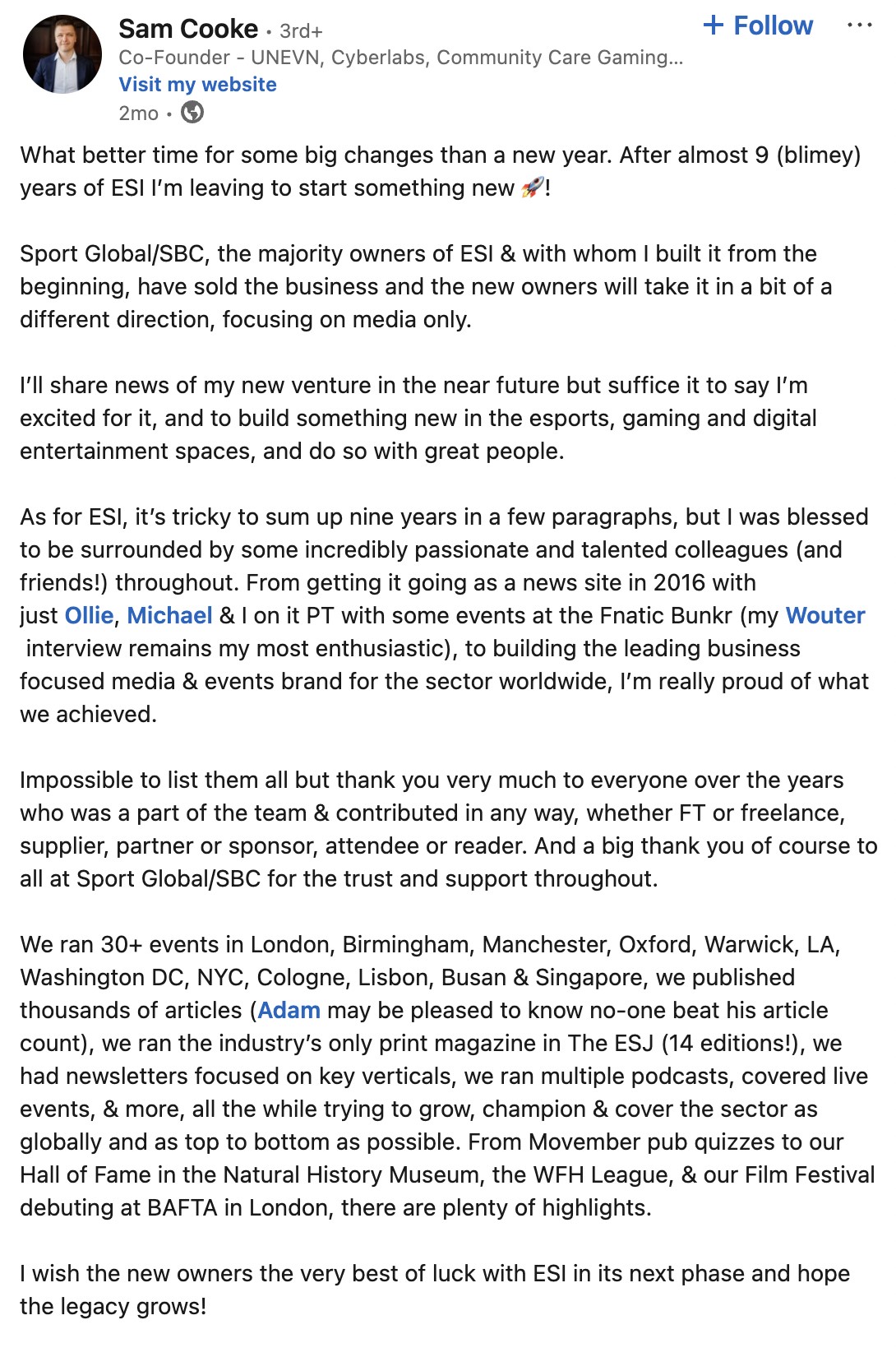
That’s original managing director Sam Cooke, setting off to a new project after the business changed hands earlier this year. Note that he doesn’t name the buyer. (The company’s Twitter went quiet around the same time.)
That’s not totally weird on LinkedIn, but it is relatively unusual. Most companies take the opportunity to get the press-release equivalent of a photo op with everyone smiling and holding the check. It’s publicity for all involved. But I have seen the Finixio team buy a site like this before, on the down-low.
Next, you change the site itself. Keep some of the original staff, keep making content about the original vertical.
But insert gambling and/or crypto right at the heart of the site.
Here’s Esports Insider before it got sold:
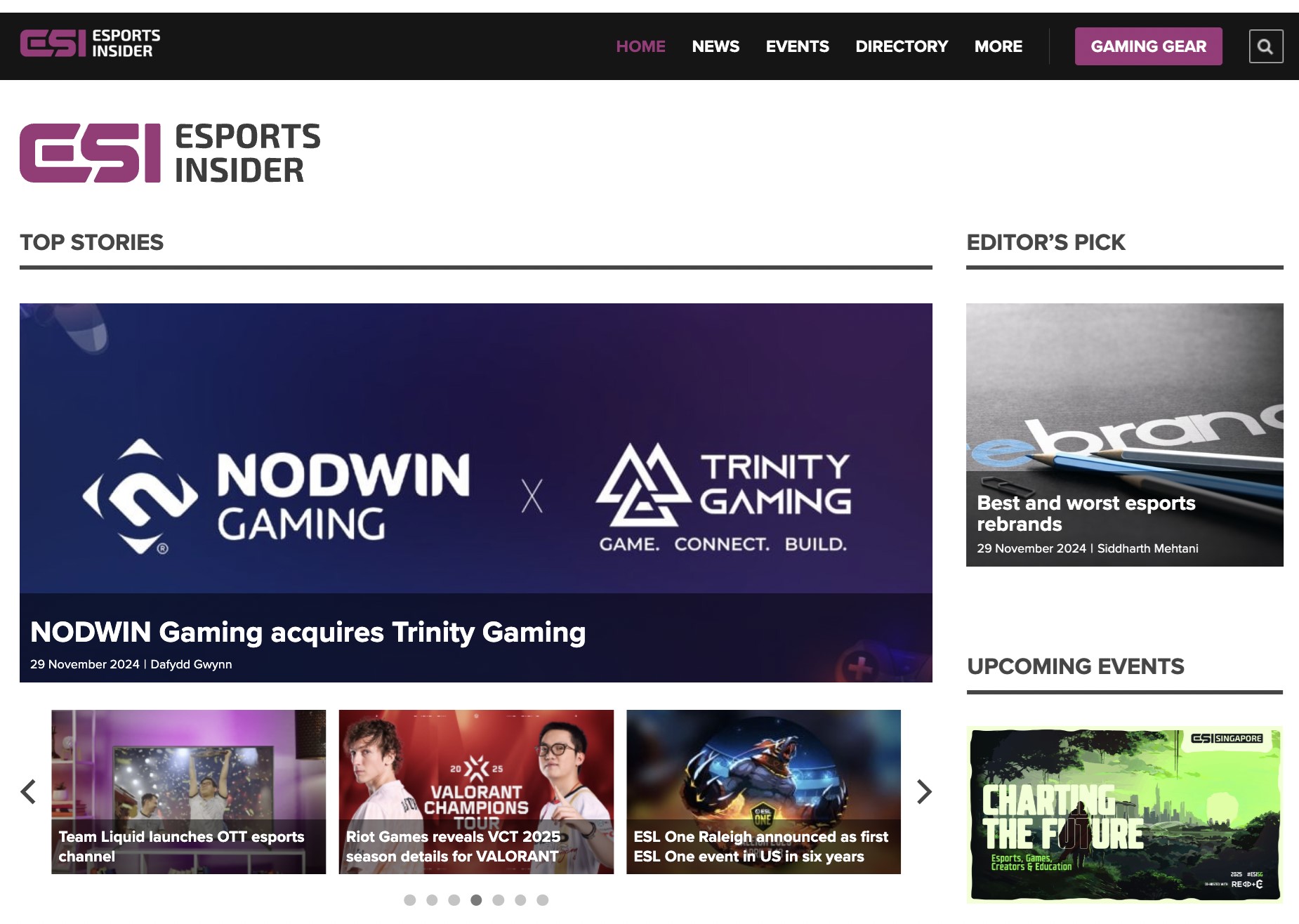
https://web.archive.org/web/20241201214703/https://esportsinsider.com/
Here it is now:
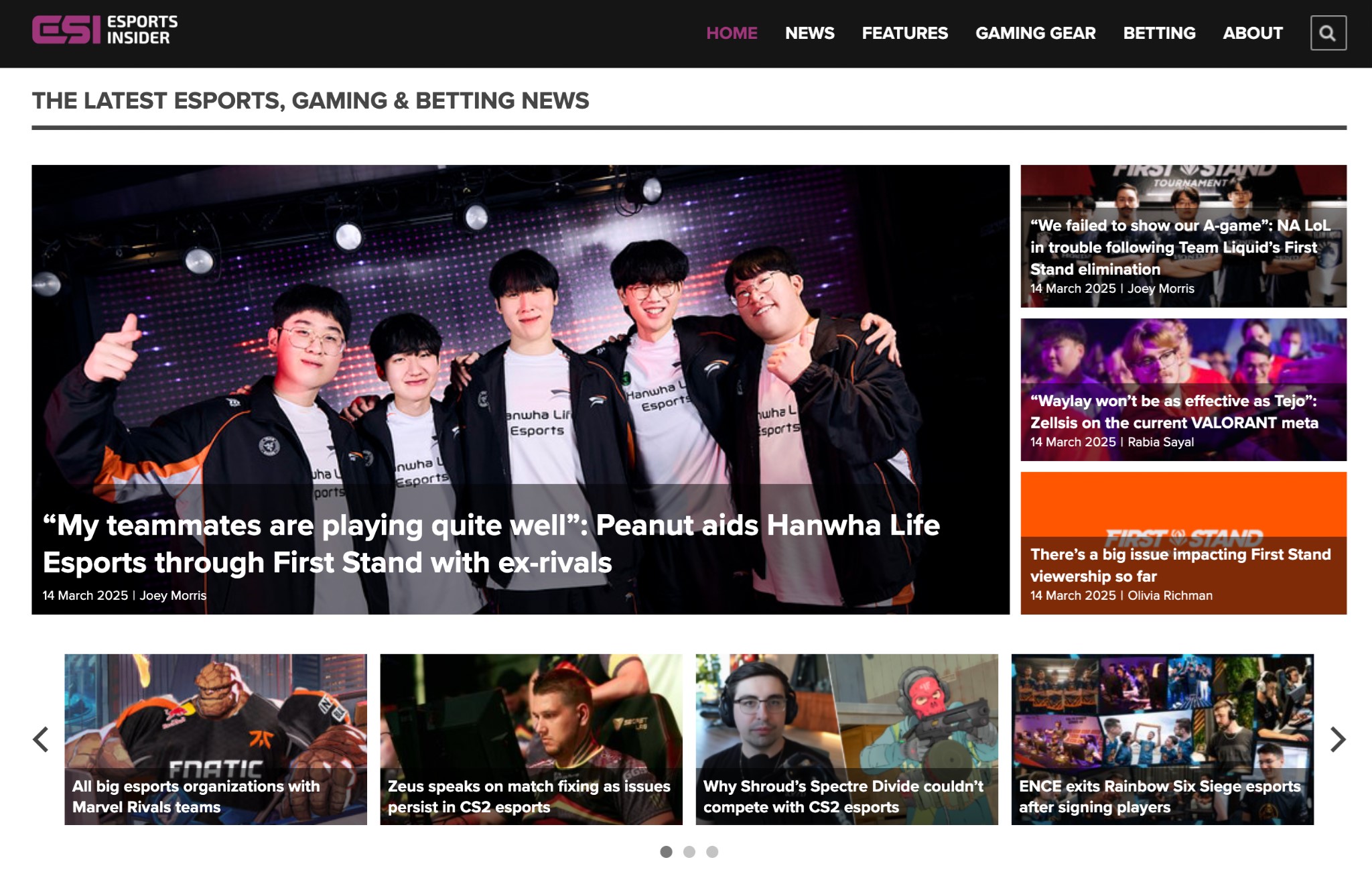
Branding is the same, the design is really similar and the focus is still clearly on esports.
This site is not aimed at me, let me just say — I don’t recognize any of these people and I don’t really understand what these headlines are about.
But I don’t need to. I just need to be able to read the word ‘betting.’ Because there it is at the top in the navigation menu.
The site grew a ‘gambling’ subfolder, almost overnight. Populated by Viola d’Elia, it had guides targeting the specific keywords that the new owners wanted to rank for.
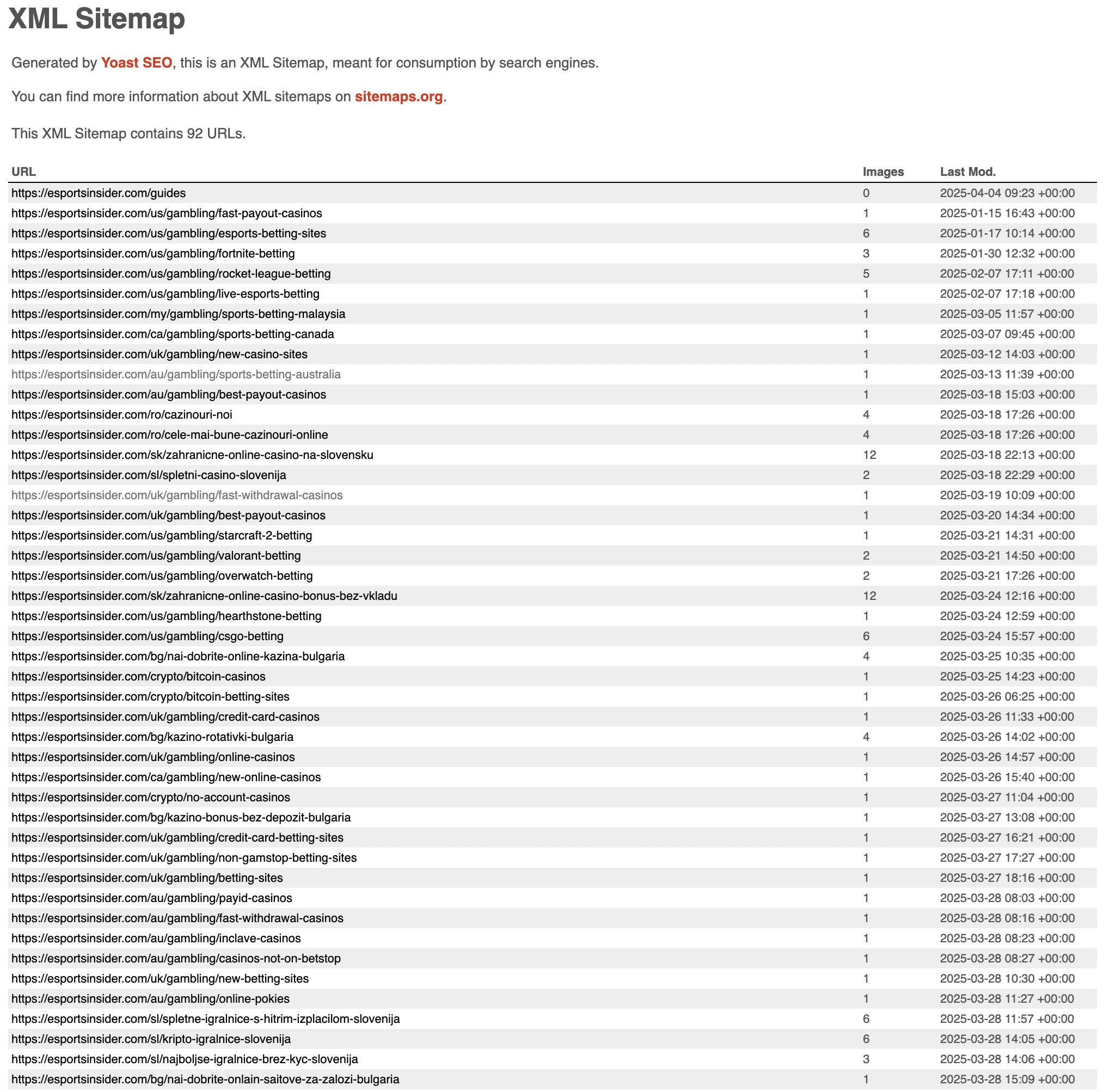 https://esportsinsider.com/guides-sitemap.xml
https://esportsinsider.com/guides-sitemap.xml
Under their /gambling subfolder is a selection of location- and keyword-specific gambling and crypto pages.
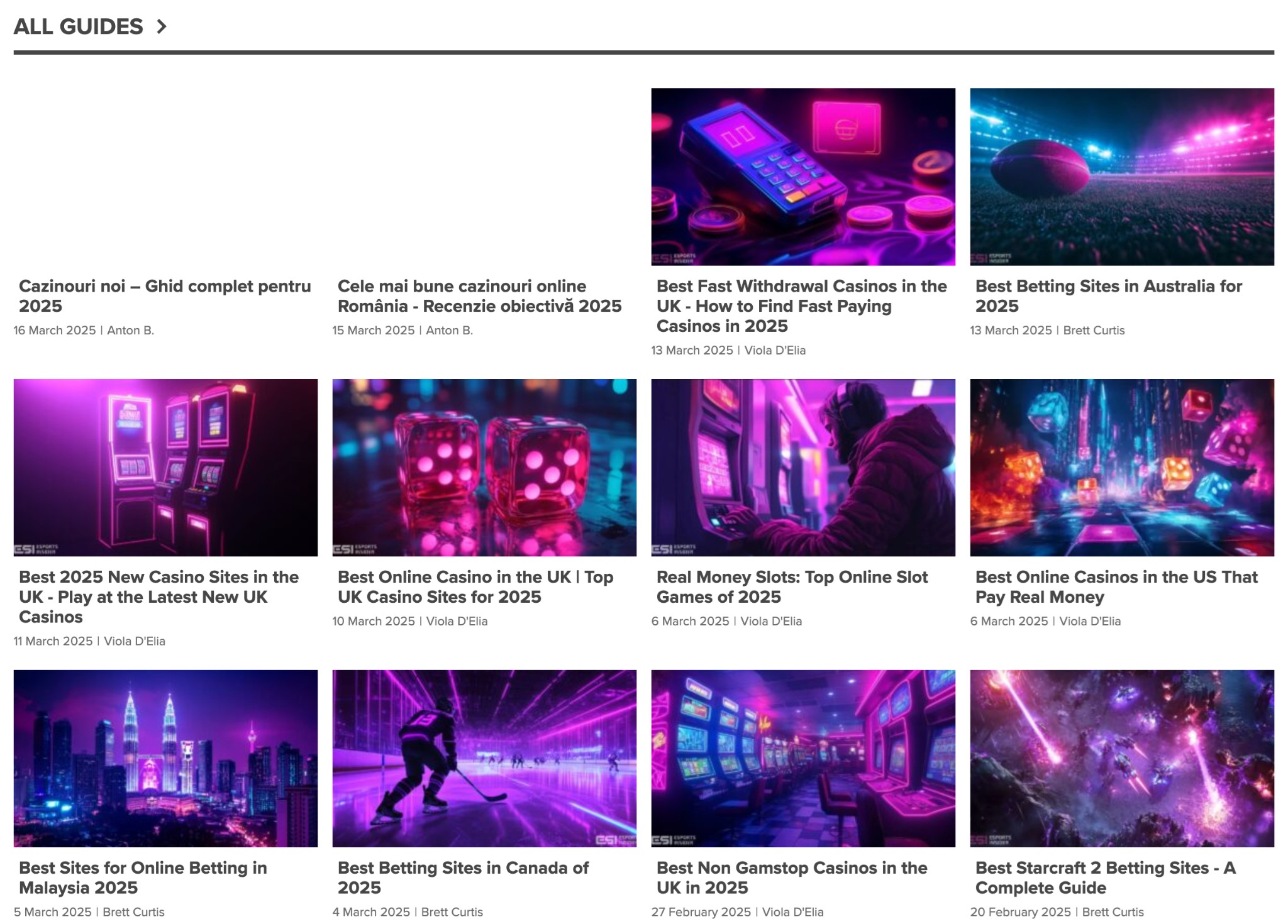
https://esportsinsider.com/gambling
The site is heaving with new gambling content in this guides-specific sitemap dated April 4, 2025. Some of these are in English but they’re uniquely regional — nobody outside Australia calls online slot machines ‘pokies,’ but there they are, four up from the bottom. There are other regional pages too, like this one:
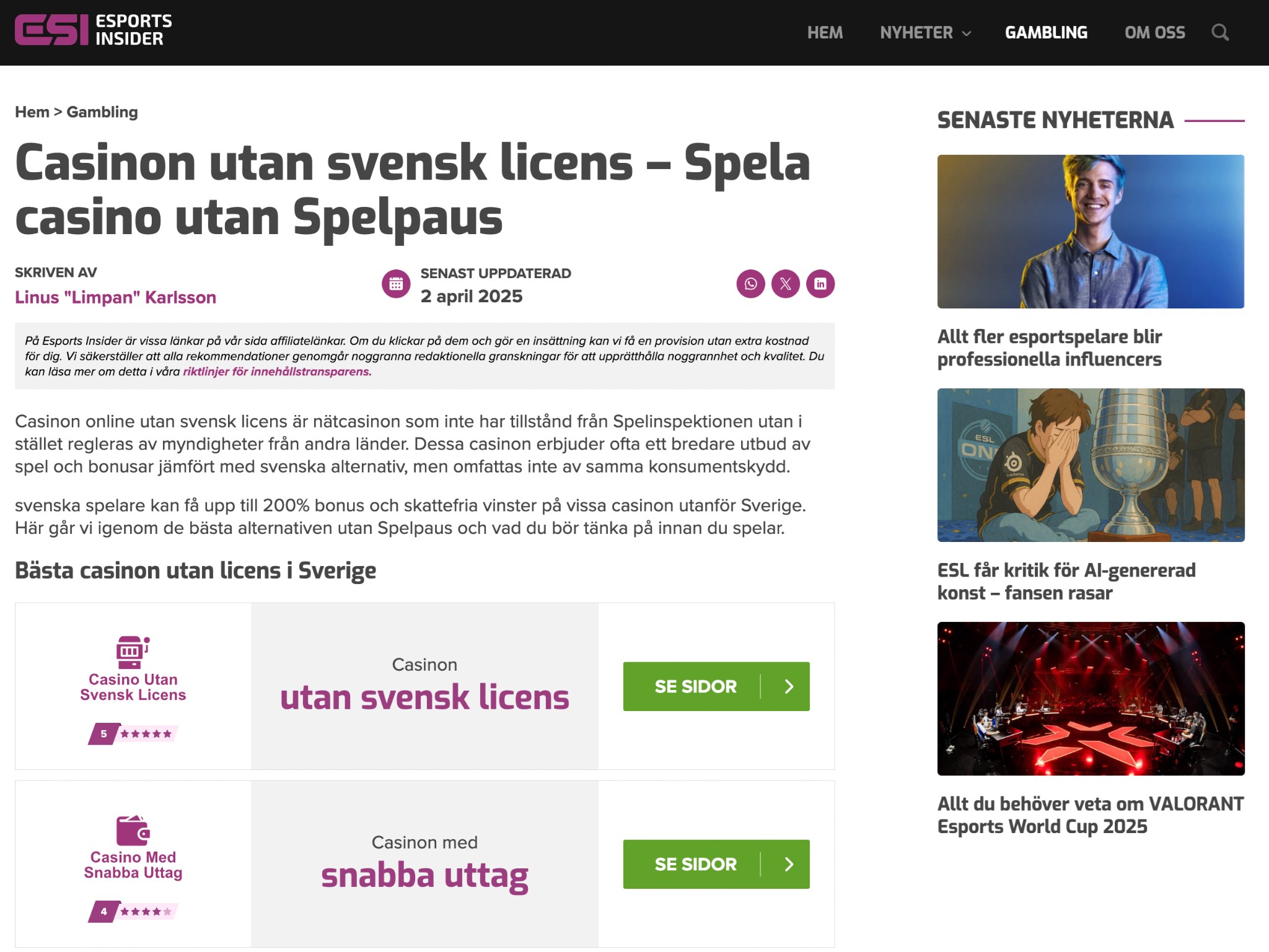
https://esportsinsider.com/se/gambling/casinon-utan-svensk-licens
What does advertising unlicensed, unregulated gambling to Swedes have to do with Esports Insider’s core business?
Nothing. No more than the Bulgarian or Slovenian pages do, or this page:

https://esportsinsider.com/crypto/no-account-casinos
Further on down the page, they advertise Best Wallet. This is the wallet always recommended by sites owned by the Finixio/Clickoutmedia team. Especially when they’re recommending accessing crypto projects owned by the Finixio/Clickoutmedia team.
The site is effectively no longer an esports site: it’s a gambling site, wearing an esports site as protective coloration.
These are their top keywords now:
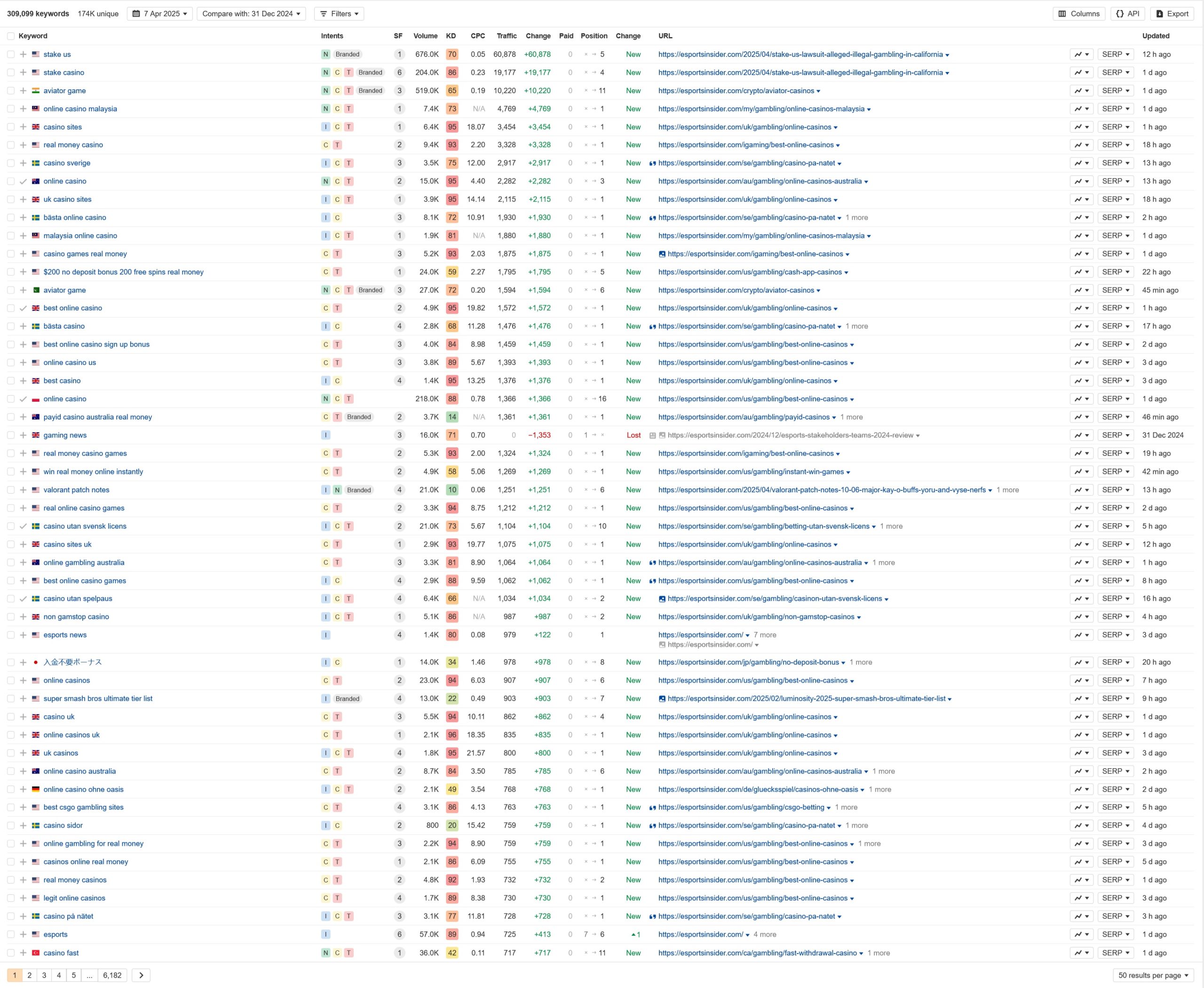
Nearly all of these are related to gambling.
This is the Finixio team way: a unique blend of the skillful and the totally brazen.
One side effect of it being really blatant, though, is that sometimes Google catches on.
Which is what happens next, of course.
The site gets penalized — once, then twice
First, the site gets penalized manually. (Or its traffic fell off a cliff suddenly for some other reason. It doesn’t line up with any major updates and there’s no evidence that anyone made major changes to the site in the time before the traffic fell off, but I have to say that I don’t know for sure.)
Following Charles’ original post flagging the site as a) a parasite operation and b) a Clickout team-owned site, it looks a lot like got whomped just like you’d expect
It was back up and sucking in dollars just a few days later.
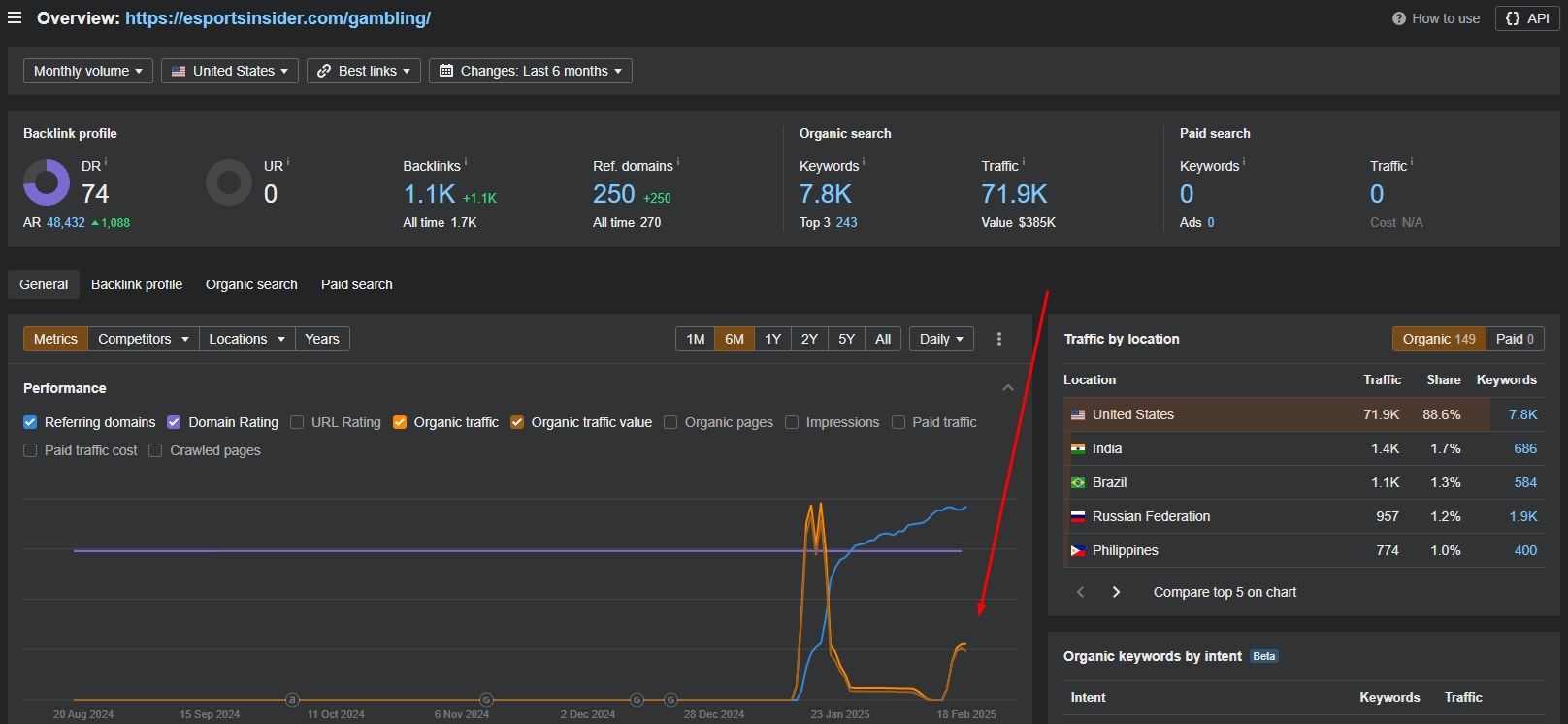
Yes, it wasn’t back to what it was — but it’s clearly out of penalty in this image.
So what happened?
Like Charles said, there’s very little algorithmic enforcement, it’s mostly manual. It’s also typically not at the site level, which means it will be the gambling subfolder that gets hit — not the root domain. Result? Kill the folder, dodge the penalty.

How to get out of this one? By changing the parent folder
They’ve switched out the parent folder twice that I know of. They came out of penalty within days after changing the ‘gambling’ subfolder to ‘igaming,’ then when they were penalized again, changed it again to ‘us/gambling.’
This page:
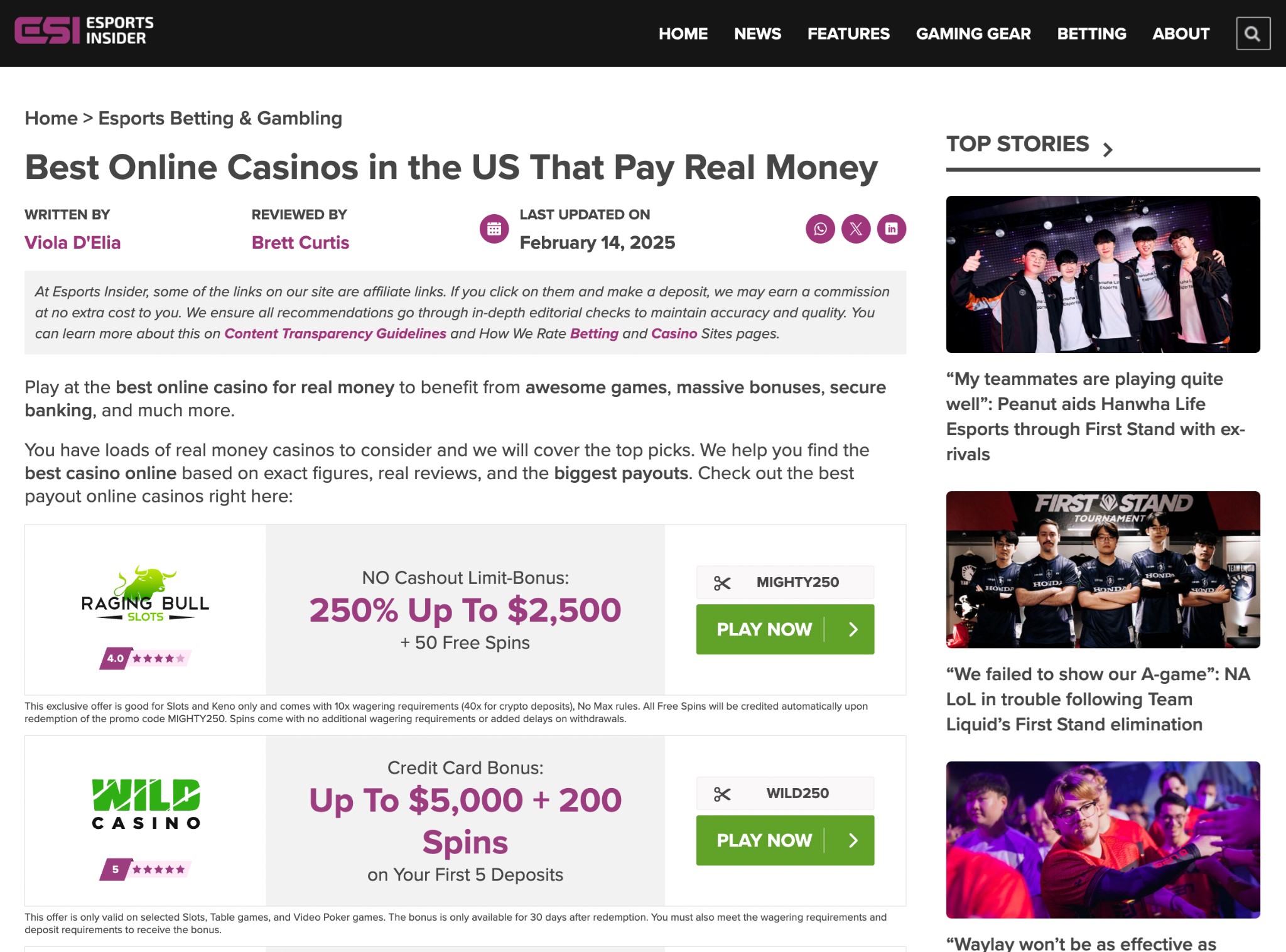
https://esportsinsider.com/gambling/best-online-casinos
…is one of the pages that got the site penalized. It would; it’s obvious, blatant parasite SEO. This page exists to make the site rank for ‘best online casinos US’ and to funnel traffic to those casinos.
If you were doing something like this, one obvious choice would be to clean your act up.
Another would be to shrug and say, win a few, lose a few, and shut up the website.
Or you could dump all the content that’s causing the trouble. And when they get hit with a manual penalty, especially a subfolder penalty, that’s what most people do. They drop the offending content, they come out of penalty, and they…
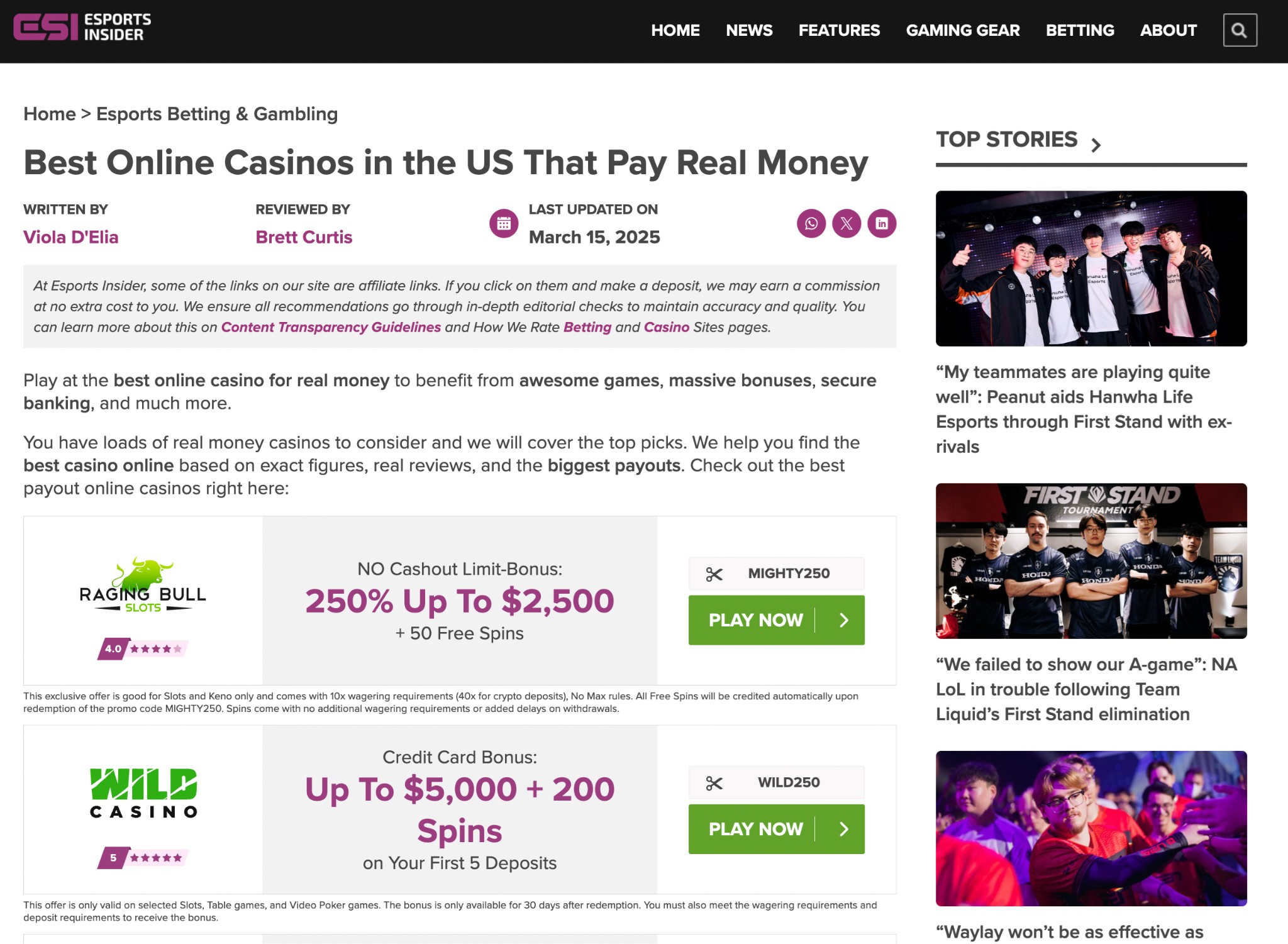
https://esportsinsider.com/igaming/best-online-casinos
Hold up.
The ‘last updated’ date is different, and the URL is different. ‘Gambling’ has become ‘igaming.’ But literally nothing else has changed.
From the headline to the byline, from the fine print in the casino ads to the Top Stories, these are… the same page. When I first looked at this — and it’s a couple of weeks back now — the change was recent, and the new /igaming subfolder held the majority of the content that was previously in the /gambling folder, similarly identical and republished.
It’s visible in SEO tools too.
After the first penalty they changed the name of the /gambling folder to /igaming…
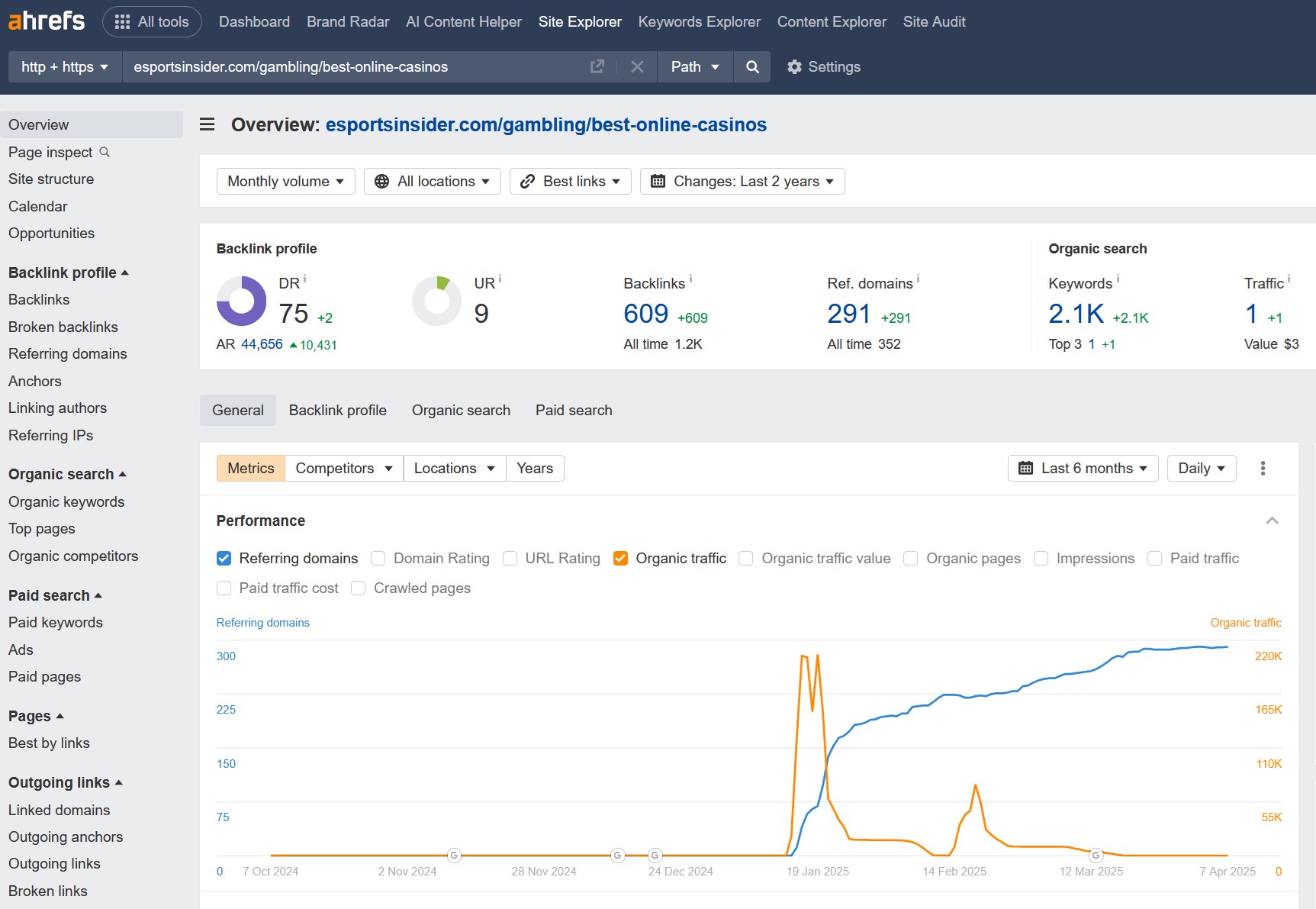
and they were back in business.
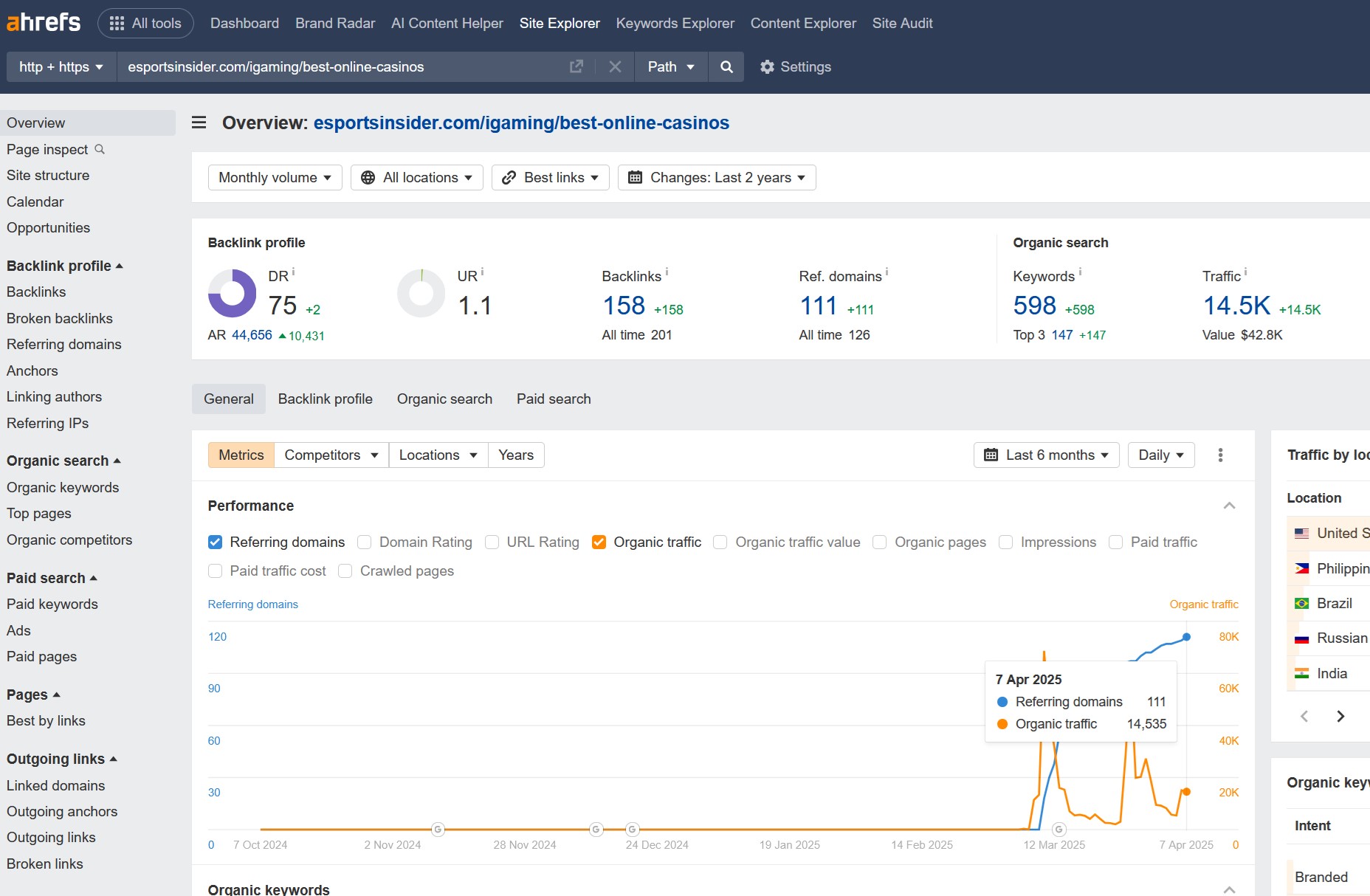
When they were penalized again, they changed the folder name again.
The picture was a little blurred: some Guides were on the /igaming/ side but contain recommended content that leads to /gambling/:
Some took you to urls like this instead:
https://esportsinsider.com/lp/fast-withdrawal-casinos
These are location-specific URLs.
Esports Insider had dumped the offending content — and instantly republished it in a new subfolder, escaping the penalty without the tedious business of losing a red cent of affiliate, crypto or gambling income. Yet, somehow they’d done it while some of the original content was still up and still indexed. Did they use htaccess to block off google? Did they re-assign content to the new folder a page at a time, then recrawl, looking for the balance that would let them leave as much in place as possible?
Almost immediately, the site was targeted again for a manual penalty, after Charles, who was watching them by this point, noticed their traffic bounce back and did a little digging.
Whereupon, they deleted the /igaming subfolder and opened a new one, /betting.
esportsinsider.com/igaming now redirects to a random news article that has a similar url, https://esportsinsider.com/2025/03/igaming-fuels-philippines-betting-boom-with-record-7-16-billion-revenue:
And esportsinsider.com/gambling?
That redirects to /betting.
Funnily enough, only the top level of the subfolder seems to be affected; just like before, when you actually select a guide you often end up at /cc/gambling/xyz, like this:
So do the URLs that once filled the /igaming folder, like ‘best online casino’:
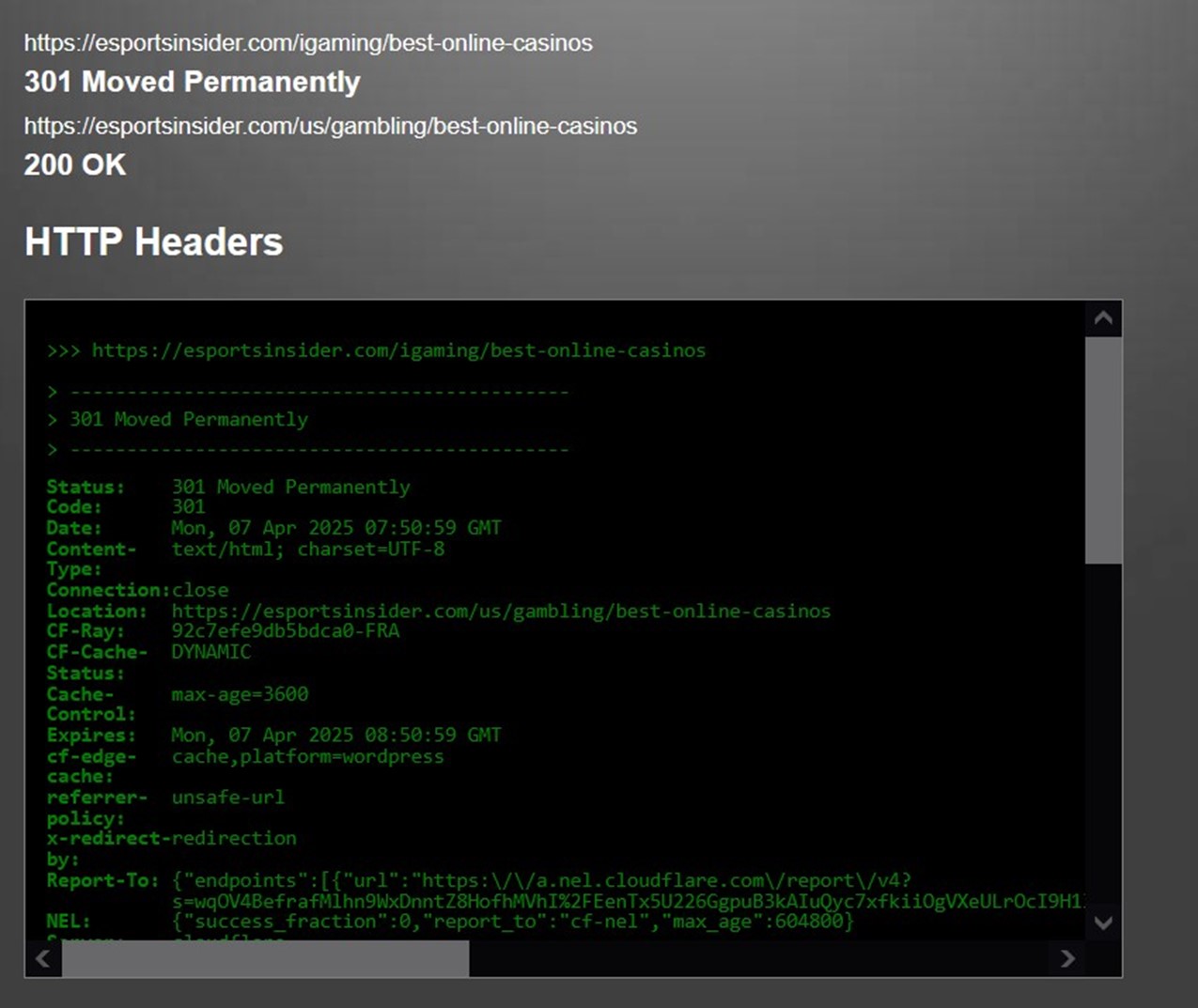
Meanwhile /betting just redirects to country code-specific URLs that are still tagged ‘gambling.’ So you’re seeing localized pages: esportsinsider.com/us/gambling/[content].
Is that the secret to hiding them?
Like with other Clickout team-owned sites I’ve seen, they’ve swerved just enough to dodge the penalty and get back in the game. Also just like those sites, it’s all stuff a human being would have seen a mile off. It wasn’t hard to find this out, I just had to go to the site and click some stuff.
That tells me that Google hasn’t done that. If this had been inspected by a human person, tactics this transparent would never have worked.
And they’re out again
Esports Insider was hit at least twice with what look like manual penalties, always at the subfolder level.
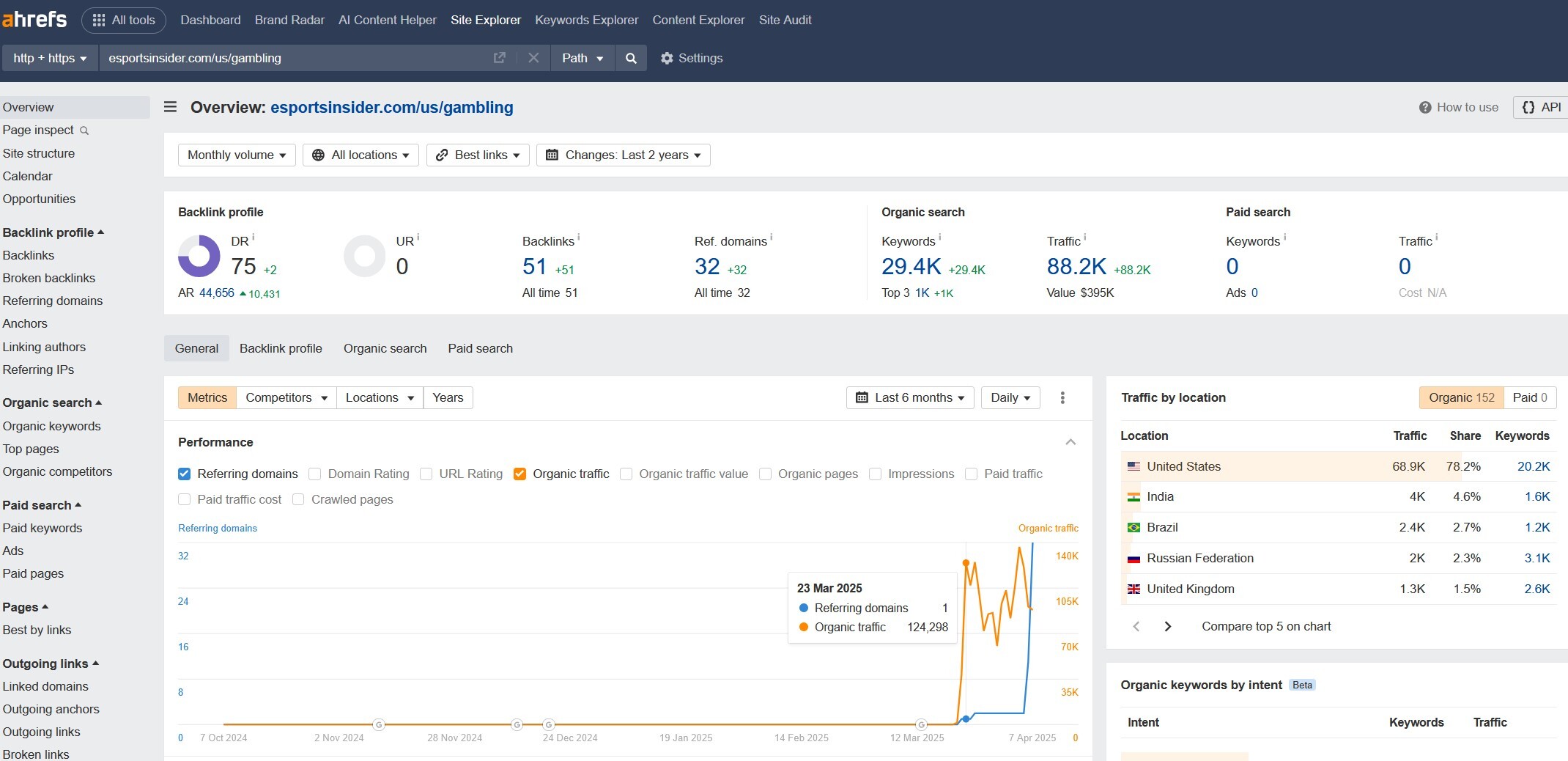
You can see the traffic fall, recover, fall, recover, wash, rinse and repeat. The same content, at the same URL, just bounces back, even while they change the names of subfolders to obfuscate what’s really there. (In a way that tells you no human has looked at this: it would take an AI not to realize that ‘gambling’ and ‘betting’ are the same thing.)
It’s the same story for location-specific pages:
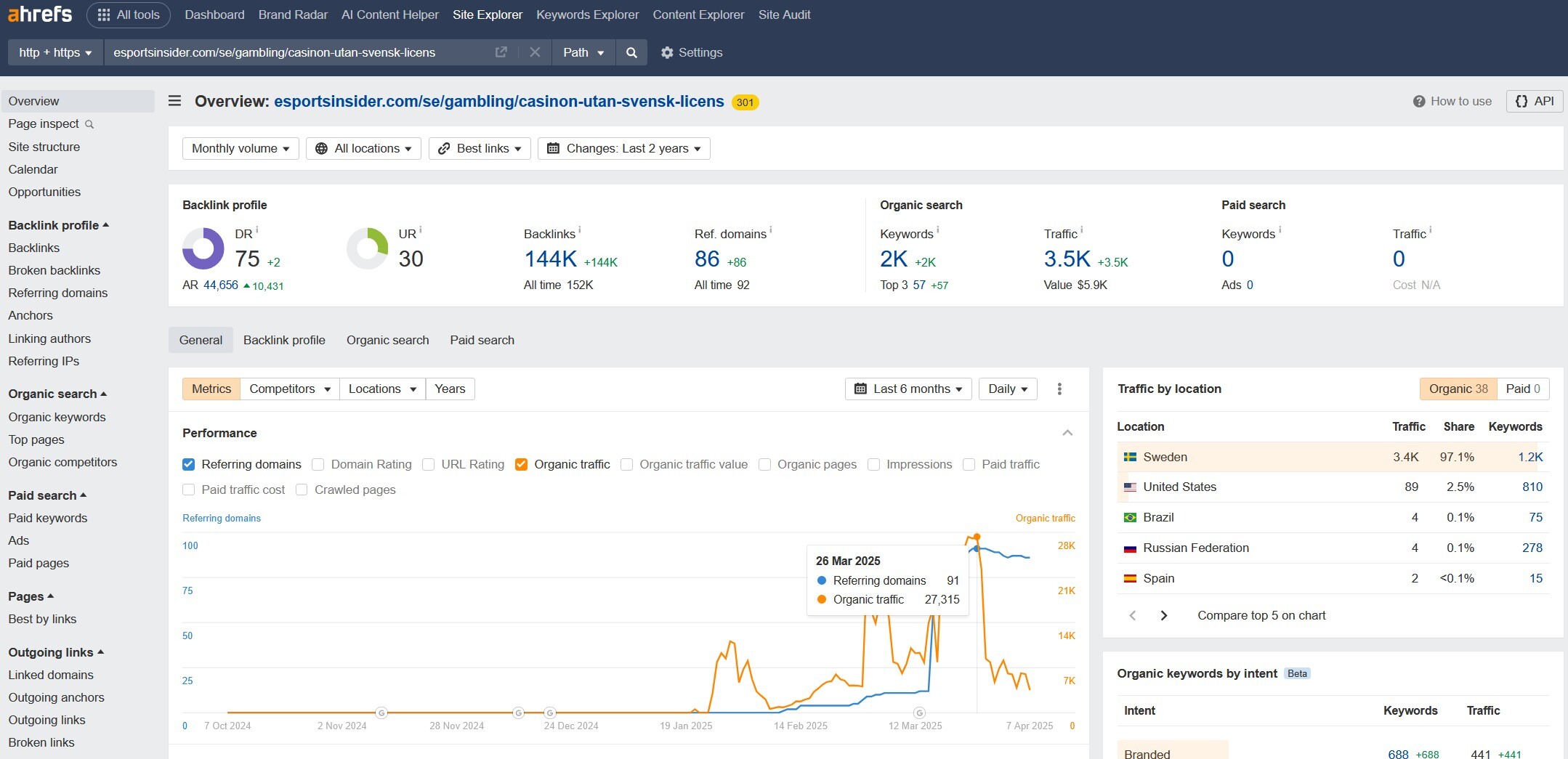
You couldn’t get more location-specific than ‘casino utan svensk licens’ (casino without swedish license). No-one outside Sweden could possibly care. But here it is — getting slapped down and bouncing back up, time after time. The same content, the same URL, and the same story: reskin the top layer of subfolder and all your gambling content can continue to benefit from the link juice and domain authority built up over the years when Esports Insider was a real business.
There’s no sign that anything is going to stick here. When I was watching the antics of the same company at Techopedia, one of their earliest and most successful parasite operations, the site was absolutely nuked several times. So severely, I would have sworn they would never be able to recover.
Each time they staggered back until eventually they got a penalty they couldn’t wriggle out from under. When that happened, they stripped the site back to the metal and reskinned it as a pure gambling site. They used it up and as it lost reputation they simply retooled it to be usable in its current state. Sure, it’s destroyed now, but who cares? You just move on to the next one.
And Techopedia faced sitewide penalties that degraded the owners’ ability to use the site at all; it wasn’t specific subfolders but the whole domain that suffered. At Esports Insider, it looks like penalties are applied narrowly and shallowly: subfolders only, and ignoring what’s happening a layer down, where localized pages that still have ‘gambling’ in the URL are pulling in language- or location-specific traffic all over the world.
Without an algorithmic response to this kind of abuse, parasite SEO is not going to go away: it’s going to eat the internet. And why not? Localization is dead, as is topical authority. You didn’t used to be able to rank instantly internationally, fueled by the high authority backlinks your English mainpage had. Yet this page ranks in Sweden, powered by the authority of the .com domain.
Maybe Google just doesn’t care about this stuff anymore? In a recent profile, the company’s Head of Search Elizabeth Reid called sending traffic to publishers a ‘necessary evil’ that Google was trying to move away from, and foresaw gradual deprecation of the search bar itself. Instead, Google will increasingly focus on voice search, video search and AI overviews (despite their catastrophic inaccuracy).
Already, most major media sites do some pay-to-play stuff, thinly disguised ‘sponsored content’ that you can slip them cash to appear in. (I know. I have made those payments myself.) But the Finixio team playbook is different — destabilizing, debilitating. Buying sites and turning them to parasites will eventually consume the middle of the internet. All the sites that aren’t WordPress+Shopify+$300/month in sales and aren’t owned by a global brand will wind up getting eaten from inside, either by the Finixio team or by copycats even less scrupulous than they are.
